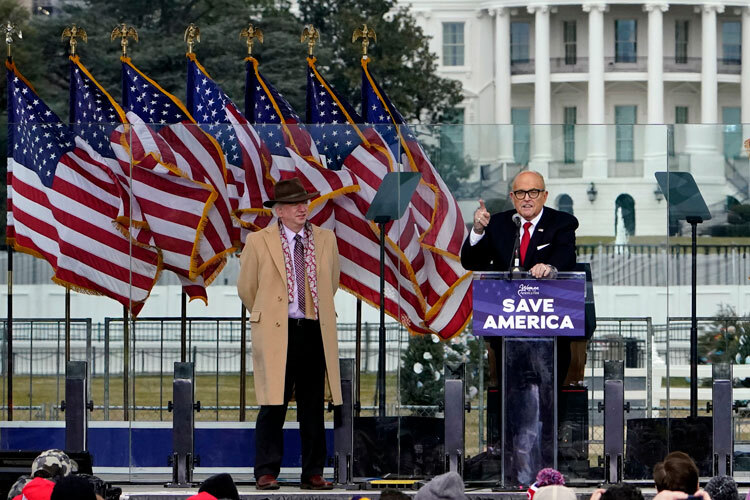Chapman University says it didn’t authorize law prof’s representation of Trump, yet work was on server

John Eastman (left) joins lawyer Rudy Giuliani at a Washington, D.C., rally on Jan. 6, 2021, in support of then-President Donald Trump. They spoke before the attack on the U.S. Capitol. Photo by Jacquelyn Martin/The Associated Press.
Law professors often use school emails when representing clients, but they may want to rethink that, following a recent subpoena sent to Chapman University from the House Select Committee investigating the Jan. 6, 2021, U.S. Capitol attack, seeking documents from former faculty member John Eastman.
The Jan. 20, 2022, subpoena relates to the constitutional law professor’s legal representation of former President Donald Trump and the 2020 election, and includes emails, contact lists and calendar entries on the university server.
Eastman retired in January 2021. On Jan. 25, 2022, the U.S. District Court for the Central District of California ruled against Eastman’s motion to quash the subpoena and enjoin the committee from enforcing it. Among his arguments, Eastman claimed the server documents included attorney work-product, which have a privacy expectation.
Eastman had no expectation of privacy on the university server, and a written school policy said as much, according to the government’s Jan. 21 motion opposing Eastman’s TRO request.
Also, when Eastman logged on to the Chapman network, he was greeted with a splash screen message, stating that use of the system constitutes consent his activities or information could be subject to monitoring, according to the government’s filing. Eastman is a former dean of the law school, and has served on the faculty for more than 20 years.
Chapman filed a Jan. 21 response regarding the professor’s TRO request. It did not authorize Eastman’s work representing Trump, the filing states, and doing so would have violated the university’s 501(c)(3) tax status, because IRS rules prohibit such institutions from using resources, including computer networks, for political campaigns or on behalf of political candidates. Also, the brief stated the school had no interest in determining whether any of the documents involve attorney-client privilege.
“I suspect most law professors assume their emails are private. This surprises me a bit because I often comment publicly that people too frequently are lulled into carelessness about what they say in emails and then are shocked that emails are discoverable—in situations ranging from divorces to congressional subpoenas,” Catherine Ross, a George Washington University Law School constitutional law professor, told the ABA Journal in an email.
A Chapman University spokesperson told the ABA Journal it does not comment on ongoing legal matters. The school did say it is “complying with the court and all parties have committed to work cooperatively to produce the subpoenaed items.”
Charles Burnham, Eastman’s attorney, declined to comment.
The lawsuit also argued that Congress has no power to issue subpoenas for law enforcement purposes, and the subpoena violated committee rules, because the committee did not have validly appointed minority members.
A Jan. 25 order denied Eastman’s motion for preliminary injunction, on the basis it was unlikely to succeed on its merits. The order notes that at a Jan. 24 hearing, Eastman and the government reached an agreement where he would be provided with all responsive documents, review them and make a privilege log, while producing non-privileged documents on a rolling basis.
Also, the order states that Eastman can renew attorney work-product claims for specific documents identified during document production. According to Chapman’s Jan. 21 filing, the university identified 19,000 documents that may be responsive to the subpoena.
Although it’s Eastman’s ethical responsibility to check for attorney-client privilege regarding his emails, the university also has a duty to make sure nothing in the subpoena violates the Family Educational Rights and Privacy Act, which covers student information or the privacy rights of their employees, says Michael O’Brien, an Anchorage, Alaska-based partner at Perkins Coie who represents colleges and universities in employment matters.
Most university general counsel offices do not have sophisticated discovery review tools, according to O’Brien. He estimates that hiring outside counsel to review 19,000 items would cost “tens of thousands of dollars,” especially if there are many documents with varying types of privacy obligations.
“You may have no dog in the fight, but you are bound by privacy rules to deal with it,” says O’Brien, who previously served as an associate general counsel for the University of Alaska.
He adds that universities usually vet any legal work a law professor wants to take on, and the process includes a conflict-of-interest check.
“Eastman has argued that this was a service component of his academic work. Based on my review, I doubt it was pitched that way,” O’Brien says.
Meanwhile, the court on Jan. 31 issued an order directing the parties to file a written stipulation with the terms of the agreement for document review, and telling Eastman to begin document production with items dated between Jan. 4, 2021, and Jan. 7, 2021. It also says he is expected to review and process 1,500 pages of documents per day.
Eastman does not have to produce any communications with his family, according to the order.
“I would counsel any professor not to conduct any private communications through their university emails,” Michael Thad Allen, a Connecticut lawyer who represents faculty in university disputes, told the Journal in an email. Employees, he adds, have no expectation of privacy on an employer’s server.
“I know of no additional expectation of privacy that attaches to a law professor, rather than, say, an engineering professor or anyone else,” Allen wrote.
See also:
ABAJournal.com: “Trump’s executive privilege bid could be hindered because of his use of campaign funds”
ABAJournal.com: “Law prof’s memo told Pence he could give Trump election win as ‘ultimate arbiter’ in elector count”



